|
|
|
Sort Order |
|
|
|
Items / Page
|
|
|
|
|
|
|
| Srl | Item |
| 1 |
ID:
115603
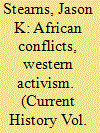

|
|
|
|
|
| Publication |
2012.
|
| Summary/Abstract |
For much of Africa's post-cold war history, the question has not been whether humanitarian intervention is a cover-up for big power interests, but why outsiders have been so reluctant to act.
|
|
|
|
|
|
|
|
|
|
|
|
|
|
|
|
| 2 |
ID:
182833
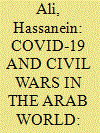

|
|
|
|
|
| Summary/Abstract |
The post-Arab Spring period witnessed the outbreak of devastating civil wars in Syria, Libya and Yemen. These wars had many disastrous impacts on these countries, which threatened their existence as political entities. The Covid-19 pandemic exacerbated the problems facing these countries, especially in light of the collapse of their infrastructure and health care systems. In spite of this, the pandemic and its consequences did not mitigate these civil wars. In this context, this article aims to answer the following question: Why do civil wars continue in the Arab world, despite the Covid-19 pandemic and its disastrous consequences? In other words, why didn't the pandemic create a new dynamic that pushes for the settlement of the civil wars in Syria, Libya and Yemen?
The article provides five reasons to explain this phenomenon. First, the worsening situation in Syria, Libya, and Yemen before the emergence of the Covid-19 pandemic, due to civil wars in these countries turning into protracted conflicts. Second, the nature of the civil wars as proxy wars, due to the large number of regional and international actors that have been involved in each of them. Third, the expansion of war economies in these countries; this phenomenon feeds civil conflict and sustains it. Fourth, the disintegration of the nation state in Syria, Libya, and Yemen, due to the absence of a strong central government, and the multiplicity of actors that control the state's territory. Fifth, the inefficiency of the means to peacefully settle Arab civil wars, mainly through the political efforts of the United Nations.
|
|
|
|
|
|
|
|
|
|
|
|
|
|
|
|
| 3 |
ID:
130794
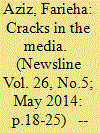

|
|
|
| 4 |
ID:
144337
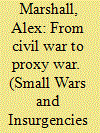

|
|
|
|
|
| Summary/Abstract |
The use of surrogate or ‘proxy’ actors within the context of ‘irregular’ or guerrilla conflict within or between states constitutes a phenomenon spanning nearly the whole of recorded human military history. Yet it is a phenomenon that has also acquired urgent contemporary relevance in the light of the general evolution of conflict in Ukraine and the current Middle East. This introduction to a special issue on the theme investigates some potentially important new avenues to studying the phenomenon in the light of these trends.
|
|
|
|
|
|
|
|
|
|
|
|
|
|
|
|
| 5 |
ID:
146574
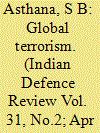

|
|
|
|
|
| Contents |
To flourish a terrorist outfit needs financial and logistics support, political patronage and a
supportive of submissive population, which is the centre of gravity in prospering or combating
terrorism (providing recruitment, intelligence, misguided ideology/religious narrative, media and cyber/technological support). To combat such dangerous terrorist outfits and save innocent population, it is of utmost importance to cut down its support system, its patronage and assistance, sincerely and honestly by every single legitimate power in the world, selective degrading of some organisations such as the ISIS with minimum callateral damages and take onboard some religious leaders, who can support the narrative of peaceful eoexistence for all communities.
|
|
|
|
|
|
|
|
|
|
|
|
|
|
|
|
| 6 |
ID:
069420
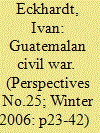

|
|
|
| 7 |
ID:
173543
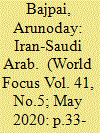

|
|
|
|
|
| Summary/Abstract |
The rivalry between Iran and Saudi Arabia is the defining feature of strategic landscape of Middle East. Some may view it as Shia-Sunni fault line, some may view it desire for regional leadership or still other may view it as the outcome of the great powers politics in the resource rich region. The rivalry between Iran and Saudi Arabia is all this and even much more.
|
|
|
|
|
|
|
|
|
|
|
|
|
|
|
|
| 8 |
ID:
109044
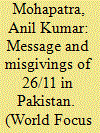

|
|
|
| 9 |
ID:
175502
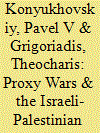

|
|
|
|
|
| Summary/Abstract |
In this paper, we analyze the Israeli-Palestinian conflict by proposing a proxy war model, where conflict lasts longer, but it is less costly than direct military confrontation. In proxy wars, Nash equilibria are realizable, but not always sustainable in the long-run. The consolidation level of the double principal–agent relationship predicts the continuation of conflict and thus the emergence of peace. As our model suggests, the Israeli-Palestinian conflict is likely to remain irresolvable, as long as the Palestinians do not have a principal that is willing to provide continuous and positive levels of conflict involvement.
|
|
|
|
|
|
|
|
|
|
|
|
|
|
|
|
| 10 |
ID:
144341
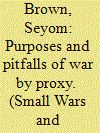

|
|
|
|
|
| Summary/Abstract |
The structure of the emergent global system – a volatile ‘polyarchy’ of state and non-state actors – accentuates temptations to employ military proxies, but also multiplies the risks when the priorities of the patron states and their proxies diverge. The motivations of proxies and the interests of the countries employing them are hardly ever sufficiently close, and the command-and-control arrangements sufficiently tight, to ensure that the battlefield behavior of proxies will not distort the military strategies and political objectives of their patrons. This article offers guidelines for reducing the risks and minimizing the consequences of such loss of control.
|
|
|
|
|
|
|
|
|
|
|
|
|
|
|
|
| 11 |
ID:
154836
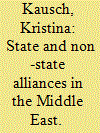

|
|
|
|
|
| Summary/Abstract |
Proxy relationships between non-state challengers and their external state patrons in the Middle East are a factor that can weaken regional stability as non-state proxies become both a tool and a decisive factor in shaping inter-state competition between regional powers. As a result, non-state actors with regional influence must increasingly be factored into policy decisions in military, diplomatic and legal terms.
|
|
|
|
|
|
|
|
|
|
|
|
|
|
|
|
| 12 |
ID:
159360
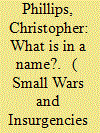

|
|
|
|
|
| Summary/Abstract |
Post-uprisings Middle East politics is frequently described as a ‘regional cold war’ involving proxy warfare that emphasises the role of shared identities linking external and local actors. But does the ‘content’ of identities impact proxy war dynamics? This article considers the present ‘battle for Syria’, a local conflict that became a theatre for multiple proxy wars involving actors emphasising identities on various levels, most notably national, religious/ sect and ethnic. It suggests that identity content does matter, with global powers more reluctant than regional players to back groups identifying at sub-national level, while foreign non-state actors are enthusiastic backers of sub-national identity.
|
|
|
|
|
|
|
|
|
|
|
|
|
|
|
|
|
|
|
|
|